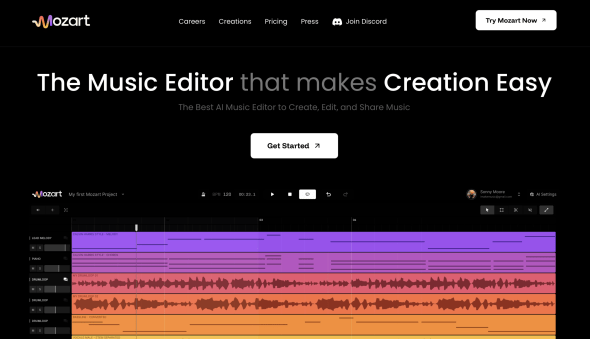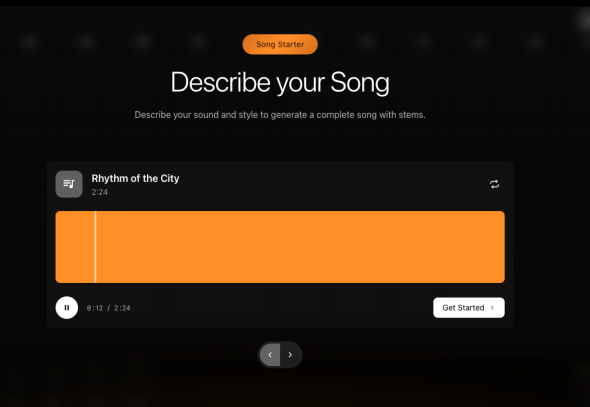Mozart AI The AI Songwriting Assistant for Modern Creators
Mozart AI is an AI-powered Digital Audio Workstation (DAW) designed to act as a co-producer for music creators. Developed by the London-based startup Arthos Inc., the platform officially launched its public beta on July 16, 2025. This platform is built for independent artists, bedroom producers, and professional musicians who want to streamline the technical aspects of ai music production.
Mozart AI solves the problem of “technical friction”—the tedious, time-consuming tasks that often cause artists to abandon their projects, making it a useful ai songwriting tool. Its primary value proposition is its human-centered approach; rather than replacing the artist, it serves as an intelligent assistant, handling complex tasks through simple text commands. This alters the traditional, often cumbersome, music production workflow, allowing creators to focus purely on their artistic vision.
Best Use Cases for Mozart AI
- Independent Artists & Songwriters: For creators dealing with writer’s block, Mozart AI can instantly generate foundational ideas. You can use a simple text prompt to create unique chord progressions, melodies, or drum patterns, providing a creative spark to build upon. This allows artists to move from a blank slate to a workable demo in minutes.
- Bedroom Producers: The tool is perfect for producers looking to accelerate their ai music production workflow. Instead of manually searching through sample libraries, you can use the semantic search to find the perfect sound by describing its “vibe.” The platform can also automate complex mixing tasks like side-chaining or EQing, making professional-sounding tracks more accessible.
- Content Creators & Filmmakers: If you need custom background music for a video or podcast, this AI music assistant offers a strong alternative to stock music libraries. You can generate loops and musical beds tailored to the specific mood and style of your content, ensuring a unique and fitting soundtrack without needing deep music theory knowledge.
- Music Students & Educators: The platform serves as an excellent learning tool. Students can experiment with different musical structures and production techniques in an intuitive, text-based environment. It lowers the barrier to entry for learning music production, as complex functions are executed through simple, understandable commands.
Artist-Centric Philosophy: Unlike many AI music generators, Mozart AI keeps you in full creative control, acting as an assistant rather than a replacement.
Intuitive Text-Based Workflow: Its use of natural language prompts for everything from generation to mixing dramatically lowers the technical barrier for new producers.
Descriptive Semantic Search: The ability to find samples by describing their character and feel speeds up the creative process.
Completely Free (For Now): The public beta is available under a generous "Hobby" plan, making it accessible to everyone.
No Installation Required: As a browser-based DAW, it works on any device with an internet connection, offering great flexibility.
Capable AI Co-Producer: The AI is highly capable of generating musically coherent and useful ideas that can serve as the foundation for a full track.
Currently in Beta: As a new product, users may encounter occasional bugs or limitations while the platform is being refined.
Unknown Future Pricing: While currently free, the pricing and limits of the future "Producer" plan are not yet specified.
Limited Integrations: There is currently no information on support for third-party plugins (VSTs) or integration with other DAWs like Ableton Live or Logic Pro.
Relies on Internet Connection: Being browser-based means you cannot work on your projects offline.
-
AI Co-Producer: The core engine that generates musical elements like melodies, chords, and basslines from natural language prompts.
-
Semantic Sample Search: A unique search function that lets you find audio samples by describing the sound you want (e.g., “dark, gritty synth bass”).
-
Text-Based Mixing & Mastering: Apply effects like compression, reverb, EQ, and side-chaining by simply typing commands.
-
Style Referencing: Guide the AI’s output by providing examples or describing the style of other artists.
-
TAB Mode: An AI-powered autocompletion feature that suggests notes, chords, and drum patterns as you work.
-
Track Agent: Specialized AI agents assigned to each track that help generate more precise and context-aware musical ideas.
-
LoopGen: An on-demand tool for creating unique one-shots and loops tailored to your specifications.
-
Browser-Based DAW: A fully functional Digital Audio Workstation that runs directly in your web browser with no installation needed.
 Mozart AI Homepage
Mozart AI Homepage
 AI Music Generator
AI Music Generator
Frequently Asked Questions
-
What is Mozart AI?
Mozart AI is an AI-powered Digital Audio Workstation (DAW) that acts as a co-producer, helping artists create music more efficiently using text-based commands. -
Who should use Mozart AI?
The tool is designed for independent artists, music producers, songwriters, and content creators who want to speed up their creative workflow. -
Is Mozart AI free to use?
Yes, the platform is currently free for all users under its “Hobby” plan during the public beta phase. -
How is Mozart AI different from another ai music generator like Suno or Udio?
Mozart AI is a collaborative DAW that assists in the production process, leaving the artist in control. Suno and Udio are generative AI tools that create entire songs from a single prompt. -
What do I need to use this tool?
You only need a modern web browser and a stable internet connection to use the platform, as it is a browser-based application. -
How does an AI music generator work?
An AI music generator functions by analyzing massive datasets of existing music. The AI model learns musical patterns, structures, and styles from this data. It then uses this knowledge to create new musical pieces based on a user’s text prompt or input. -
How do you use an AI music generator?
A user typically operates an AI music generator by writing a text prompt that describes the desired music. For generator tools like Suno, the AI produces a complete song. For co-producer tools like Mozart AI, the user provides prompts to create specific musical elements within a larger project. -
Which AI music generator is best?
The best AI music generator depends on the user’s specific needs. A generator like Suno or Udio is best for creating complete songs from a single prompt. A co-producer tool like Mozart AI is best for artists and producers who want AI assistance within their own creative workflow.
Tech Pilot’s Verdict on Mozart AI
I’ve spent a lot of time exploring AI music tools, and most fall into one of two camps: either they’re simple, one-click song generators, or they’re complex plugins for traditional DAWs. My goal in testing Mozart AI was to see if it could successfully bridge that gap and create a new, artist-friendly production experience.
First, I tested the Semantic Sample Search. I was working on a lo-fi track and needed a specific sound: “a dusty, vinyl-crackled piano chord.” Typing this into a traditional sample library would yield nothing. In this tool, it returned several usable options within seconds. This feature alone is a massive time-saver and shows the future of music production. It understood the texture and mood, not just a keyword.
Next, I put the AI Co-Producer to the test. Starting with a blank project, I gave it the prompt, “Generate a simple, upbeat indie-pop drum pattern at 120 BPM with a clean bassline.” The result was solid. It wasn’t a finished track, but it was a perfect, musically coherent starting point. The bassline locked in with the kick drum, and the groove felt natural. From there, I used the TAB Mode to add a melody, with the AI offering smart suggestions that fit the existing key and rhythm. The entire process felt collaborative and incredibly fast.
Finally, I experimented with the text-based mixing. I took my simple loop and typed, “Side-chain the bass to the kick drum and add a short, plate reverb to the snare.” The platform executed the command instantly. This is a task that, while simple for an experienced producer, can be a major hurdle for beginners. Mozart AI makes it as easy as sending a text message.
Top Alternatives to Mozart AI
While Mozart AI focuses on being a co-producer, some users may prefer an ai music generator that creates a complete song automatically. In that market, two clear leaders emerge.
-
Suno AI: Suno generates full songs, including surprisingly coherent vocals and lyrics, from a single text prompt. Its pricing is based on a credit system, with a free tier available. Suno is a better choice if your goal is to create a finished song quickly without any musical input. However, it offers far less creative control than Mozart AI, and its outputs can sometimes ignore specific user instructions.
-
Udio: Udio creates complete tracks from text prompts and is known for producing high-quality, atmospheric music that often sounds more organic than its competitors. It also operates on a freemium model. Choose Udio if you prioritize rich, layered soundscapes and want to generate music in a wide variety of styles. Its main weakness compared to Mozart AI is the same as Suno’s: it’s a generator, not a production tool, giving you minimal control.
Final Verdict
This platform is one of the most interesting developments in music technology. It doesn’t try to write the song for you. Instead, it takes on the role of a tireless, technically proficient studio assistant, handling the tedious tasks so you can focus on your creativity. The learning curve is virtually nonexistent, and the value, especially while it’s free, is undeniable. For any artist or producer who has ever felt bogged down by the technical side of making music, this ai songwriting tool offers a freeing experience for creators.

